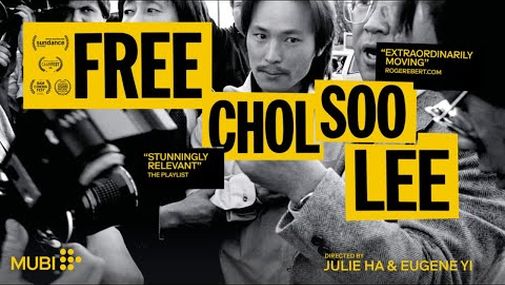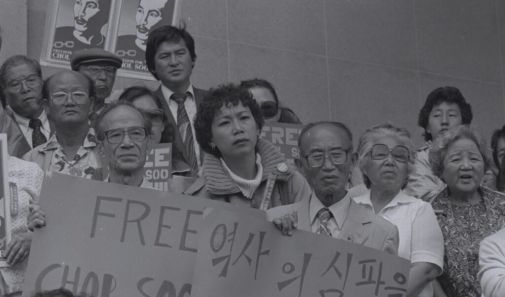Doc Corner: 'Free Chol Soo Lee'
 Thursday, September 1, 2022 at 7:00PM
Thursday, September 1, 2022 at 7:00PM By Glenn Dunks

Whether he liked it or not (most certainly the former), Chol Soo Lee was a pivotal figure in the history of the Korean people within the United States—as well as for the broader Asian community. His name came to symbolise many things, most significantly the inherent racism of anybody who wasn't white that was found within the justice system. His story was a tragic one, struggling as he did to overcome the lasting effects of what happened to him. But his plight as a man wrongly jailed for a crime he didn’t commit brought Asian and Asian-American people together and to the political forefront in ways that meant things wouldn’t be the same ever again.
In Free Chol Soo Lee, Julia Ha and Eugene Yi’s quietly damning documentary about his life inside (and perhaps even more importantly, outside of) prison, we get to reflect on a case that many may have forgotten or which they never knew about in the first place.
Chol Soo Lee isn’t Vincent Chen, who has had an Oscar-nominated documentary made about him and a recently announced television miniseries on the horizon. But in the evolution of Korean culture within America, his name is a vital one and one worth knowing and remembering.
Of course, the use of that word “free” in the title is both accurate to the rallying cry heard around his San Francisco community and beyond. But it’s also a word that confined him and followed him for his entire life—first as an immigrant at 12 years of age from a resource-depleted Korea and then as a man caught in a nightmare. The moment he was arrested for the murder of a Chinese man, misidentified by white witnesses who typified the cliches of American racial blindness, Chol Soo Lee was not free. Even once he was released from prison, his charges overturned, he was not free. He was hostage to a debt he perceived he owed the community to be a model citizen and get a good job and make good on the faith they put into him. Tied down by the realities of life for anybody who has spent a heavy chunk of their life behind bars.

He eventually succumbed to the escape of drugs and alcohol and then later to crime, one incident of which left him disfigured. Many parts of his story are familiar to many others who leave prison (guilty or otherwise). It’s impossible to know what could have become of the man if he’d never accidentally let off a bullet round streets away from a firearm murder. Thankfully Ha and Yi don’t entertain the theories. They instead tell their story with sober details, having amassed fascinating archival footage of the man, his family and the media storm that surrounded him. This footage is aided by interviews with several people involved in the story including his lawyer, Tony Serra, and Korean-American investigator reporter for the Sacramento Union, K.W. Lee. The third layer of storytelling comes from the man’s prison diaries, narrated here by Sebastian Yoon, which allow a self-reflective look into his thoughts absent the man himself who died in 2014.
Just as important as Lee himself to the story, the Korean-American community is finally given the attention it deserves it what they were able to achieve. It allows the viewer and the community itself to refocus the narrative, shifting it from one of a white saviour narrative and one where Lee was portrayed as, essentially, disconnecting himself from his Asian heritage as was portrayed in the (seemingly quite appalling) James Woods made-for-TV movie based on the story. This is thankfully where having directors of Asian descent assists and acts as a powerful endorsement for diversity in documentary storytelling.
Ha and Yi also wisely realize that Chol Soo Lee’s story did not end when he was released from prison. It’s an important coda (or, really, an entire third act) to his story that, while not the heartwarming end many may desire, shows a painful reality faced by so many in society. He may have only found something truly approaching freedom towards the end of his life, but the story of Free Chol Soo Lee is an important one worth listening to, especially in 2022 when the very idea of freedom is confronted at every turn.
Release: Currently rolling out nationally. A release through Mubi is in the future.
Award chances: A strong Oscar contender, but a bit of an old fashioned one.
 Doc Corner,
Doc Corner,  Free Chol Soo Lee,
Free Chol Soo Lee,  Review,
Review,  documentaries
documentaries 

